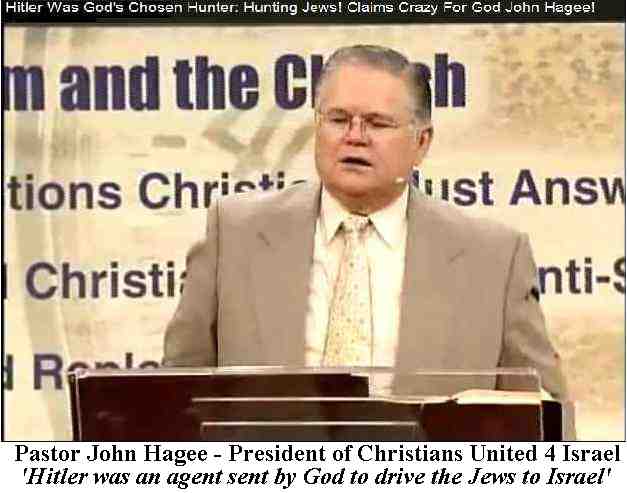One of the few genuine idiots in British public life today is the British Chief Rabbi Ephraim Mervis. It is difficult to think of a more stupid fellow. I’m still amazed at his statement, in an article for the Daily Telegraph Ken Livingstone and the hard Left are spreading the insidious virus of anti-Semitism Mirvis wrote that ‘One can no more separate it from Judaism than separate the City of London from Great Britain.’

I call Mirvis an idiot because otherwise I would have to call him a liar and I don’t want to do that. Anyone who is Chief Rabbi knows that it was an article of faith amongst Orthodox Jewry that god had exiled the Jews for their sinfulness. That it would be the decision of god to end that exile and return his people to the Promised Land and that any attempts by man to hasten that process were a blasphemy. Why else would his own predecessor as Chief Rabbi Herman Adler have so vehemently opposed Zionism? On November 12 1898 he preached:
“They ask me: If you are opposed to the idea of a Jewish state, and you don’t believe in settling millions of Jews in the Holy Land, how is this consistent with all the prayers in which we express our hope and desire for the return to Zion and the cities of Judah? How can you say the words, ‘may it be Your will that You bring us up in joy to our land and plant us in our border,’ if you do not believe in the movement that seeks to fulfill these words?

“I reply: The books of the prophets do not say that the return to Zion depends on our efforts, and will occur whenever we want it to occur. It is stated explicitly that our redemption will come by the hand of Hashem, whenever He decides to send us His moshiach. Then all the nations will join hands to bring back our scattered brethren to the land of our fathers. Are there any faint signs of moshiach now?
As Colin Shindler, an ardent Zionist wrote: (Zionism’s hated hero)
Orthodoxy also had little time for Zionism. The Kamenitzer Maggid, a brilliant speaker for the Federation of Synagogues, regarded Herzl as a second Shabtai Zevi, the false messiah of the 17th century. Even the Lubavitcher Rebbe of the time announced that religion had been substituted by nationalism. “
When Theodor Herzl wanted to hold the First Zionist Congress in 1897 he wanted to hold it in Munich. Unfortunately the Jews of Munich and in particular their rabbis objected to this antisemitic gathering and it was banned. It had to relocate to Basel in Switzerland. The idea that Zionism is to Judaism what the City of London is to Britain is a flight of fancy of someone whose village lost its idiot.

Below is an interesting essay, albeit somewhat dated since it refers primarily to George Bush, the ‘born again’ President of the USA. However together with this video and the various interesting compilation of essays in The Bible, Zionism, and Palestine: The Bible’s Role in Conflict and Liberation in Israel-Palestine, this should give a good grounding in the pernicious phenomenon of Christian Zionism, which pre-dates and indeed gave birth to Jewish Zionism.
Also included is the President of Christians United for Israel, John Hagee’s sermon when he infamously stated that Hitler was God’s agent sent to drive the Jews to Israel. Anti-Semitic or what?!!
Hagee has made determined efforts to take this video down from the Internet but unfortunately for him I’ve made multiple copies all of which are on the net!!
Tony Greenstein

Christian Zionism and American Foreign Policy: Paving the Road to Hell in Palestine
By Lawrence Davidson
The Cultural and Religious Context
The 19th century English poet and critic Matthew Arnold once observed that culture gives us a picture of how our world should be and then compels us to go out and “make it prevail.” Westerners have been doing just that for at least 500 years, and as a consequence there is scarcely a place on the globe that does not show some impact of this effort. And how have we undertaken to make our culture prevail? Traditionally, we have pursued a policy of imperialism that is supported by a number of assumptions and assertions which, alas, reflect the egomania of the Western cultural paradigm. For instance, there is the prevailing bipolar perception that the world is divided in two. On one side is a progressive and technologically advanced West. On the other side is a backward East in need of guidance. Then follows the assertion that modernity as expressed in Western style economic and political institutions is a prerequisite for societal success. Finally, there is an underlying assumption that the spread of Western civilization is inevitable and beneficial. In other words, imperialism is an altruistic endeavor. As Rudyard Kipling put it in his 1899 poem, addressed to the American people on the eve of the Spanish-American War, “Take up the white man’s burden. Send forth the best ye breed….to serve your captive’s needs.”

The West’s self-glorifying assertions are not restricted to the material. There is yet another persistently assumed aspect to our capacity to “meet its captives’ needs,” and this is the belief that the West possesses the superior religion of Christianity. Here the altruistic mission to breech the bipolar divide by bringing the backward East the blessings of good government and the hardware of progress is melded with the proselytizing zeal of Protestant evangelical fundamentalism. No where can this be seen more readily then in that part of the Middle East known as the “Holy Land” or Palestine.
America Takes the Lead
IT HAS BEEN AMERICAN DEVOTEES OF THE HOLY LAND who have most ardently melded religion and the notion of benevolent imperialism. And, they have done so with a characteristic self-righteousness that connects American manifest destiny with God Almighty. Listen to the Reverend John Codman addressing supporters of American missionaries Palestine and Greater Syria in 1836.
“How can we better testify our appreciation of [America’s] free institutions, than by laboring to plant them in other lands? For where the Gospel goes in its purity and power, there will follow in its train the blessings of civilization, and good government….Coming himself from a land of freedom, he [the American missionary] will naturally spread around him an atmosphere of liberty.”
Codman was suggesting that, just like Protestant Christianity, America too had a divinely sanctioned mission to expand its way of life, its values of economic freedom and political democracy, for the salvation of mankind. Or, as one of Reverend’s compatriots put it, America was “God’s last dispensation towards the world.”
It is not by coincidence that in the opening years of the 21st century we are still adhering to this traditional script. Many of America’s leaders since the time of Codman have held his same point of view. And now we have President George W. Bush, whose public remarks clearly indicate that he too believes the United States is God’s instrument in the divine mission of spreading modernity, development, free enterprise, and overall “freedom.” The evangelicals are also still with us, adding the ingredient of spiritual redemption. As Robert Pyne, a theologian at the Dallas Theological Seminary has observed, today’s Christian evangelicals “identify the American cause…as the cause of Christ.” As it was for John Codman so it is for today’s American fundamentalist Protestants – the United States marches through history in partnered strides with God.
The Zionist Connection
THE SAME PROTESTANT FUNDAMENTALISTS WHO SOUGHT (and still seek) to redeem the Holy Land through missionary work as well as bringing the world the blessings of the American way of life, had (and still have) a fascination with the Jews. This is because many of these evangelicals were (and still are) true believers in the biblical prophecy that speaks of the return of the Jews to Palestine as a necessary precondition for the second coming of Christ. In his book The Roots of Fundamentalism, Ernest R. Sandeen captures the importance of this connection when he tells us that many Protestant fundamentalists
“watched in fascination the formation of Zionism under Theodor Herzl and the meeting of the first Zionist Congress in Basel in 1897….Almost instinctively [they] grasped the significance of Allenby’s capture of Jerusalem and celebrated the event as the fulfillment of prophecy.”
Thus it was that, by 1917 and the issuance of the Balfour Declaration, most American Protestants who concerned themselves with the Holy Land were enthusiastic supporters of the right of the Jews, led by an active Zionist movement, to “return home.”
In terms of altruistic imperialism, the Zionists soon became perceived as a major force for the physical redemption or modernization of Palestine, as well as the realization of prophecy. They won support in the United States by claiming to be acting in a traditional American style. For instance, American Zionists quite purposely drew parallels between the American pioneer experience and the Zionist colonization of Palestine. Throughout the 1920s and into the 1930s representatives of the Zionist Organization of America placed articles in strategic American newspapers describing the Zionist “pioneers” as modern day versions of America’s “brave and religiously pious settlers.” Here are some quotes from one article that appeared in the New York Times on June 11, 1922. “These immigrants to Palestine are indeed the Jewish Puritans.” Their settlements are “the Jamestown and Plymouth of the new House of Israel.” They are “building the new Judea even as the Puritans built New England.” The settlers are like the “followers of Daniel Boone who opened the West for American settlers” while “facing the dangers of Indian warfare.” In the process “the Jews are bringing prosperity and happiness in Palestine.”
As the Zionists opened the Holy Land for settlement, the natives, the indigenous Arabs (both the Muslim majority and what American Protestants considered the “pseudo” Christian Arabs of the Greek Orthodox and Catholic “degenerate churches”), became less noticed by American and other observers except in as much as they stood in apparent opposition to redemption and modernity alike. This took the form of a process of “perceptual depopulation” that erased the demographic and cultural/religious realities of Palestine. It was a form of ethnic cleansing at the conceptual level.
Impact on US Foreign Policy
In the 20th century, the impact of these interlocking religious and imperialist-colonialist lines of thinking on U.S. government policy begins with Woodrow Wilson. Wilson was easily persuaded by Louis Brandeis to support the Balfour Declaration because of, in part, the President’s belief in biblical mythology. As he told the Zionist leader Rabbi Stephen Wise in 1916, “To think that I, son of the manse, should be able to help restore the Holy Land to its people.” Most of the American Presidents who followed Wilson were similarly pro-Zionist. However, for the men in the White House there were sometimes countervailing international pressures that limited their ability to make too public a pro-Zionist display. For instance, Woodrow Wilson was a Christian Zionist but, during World War I, he could not be as forthright about it as he might have wished because to do so would have alienated the Turks and risked the ruin of the American missionary presence in the Ottoman Empire. Just preceding and during World War II, Franklin Roosevelt, who was sympathetic to the Zionists without being religiously motivated, agreed with the State Department that too much of a public pro-Zionist display would unsettle the Middle East and perhaps drive the Arabs into alliance with the Axis Powers. After World War II, presidents such as Harry Truman, Lyndon Johnson (who likened the Israelis to 19th century “Texans fighting Mexico”), and Ronald Reagan (who had made references to Israel’s foes in terms of biblical prophecies) continued to have a basically romanticized biblical understanding of Palestine and Israel. However, even while faced with the issue of oil, they tended to be increasingly forthright in their support for Israel. Their Christian Zionist sentiments merged with the political and financial strength of the Zionist lobby to produce overtly pro-Zionist pronouncements and policies.
Congress, on the other hand, never suffered the occasional restraints felt by the executive branch. Their politics were wholly local and, very early on, the American Zionists had made themselves a force in the domestic politics of America. Thus, by 1922 Congress had passed a joint resolution in support of the Balfour Declaration and from that point on the legislative branch never looked back. They supported the Zionist interpretation of events during the 1929 Arab uprising in Palestine and the rebellion of the late 1930s. Even during World War II, when Roosevelt and the State Department were trying to keep the Arabs from deserting the British-American cause in the Middle East, Congress repeatedly tried to pass pro-Zionist resolutions calling for open Jewish immigration into Palestine.
There were varied factors that reinforced this enthusiasm for Zionism: anti-immigration sentiment among constituents during the depression and post World War II years (that led American leaders to support Palestine, rather than the U.S., as a destination for Jewish refugees), a mixture of post-war guilt and humanitarian sympathy with the Jews as victims of the holocaust, and the sheer financial and organizational clout of America’s Zionist organizations. However, the effectiveness of all these factors was underpinned by the reality that a large number of Americans, who think little of foreign policy unless it can be linked to their everyday lives, had already been conditioned to view Palestine in romanticized biblical terms. In other words, for many American Protestants (to say nothing of the American Jews) Israel was, and is still, an extension of Sunday School, and in this mythologized form does touch their lives. As Lyndon Johnson once told a meeting of B’nai B’rith, “The Bible stories are woven into my childhood memories as the gallant struggle of modern Jews to be free of persecution is woven into our souls.” Add to this Christian Zionist predisposition an updated version of the bipolar world view wherein Israel is seen as “the only democracy in the Middle East” and a Western civilizational outpost that is allegedly “just like us,” and you get the acquiescence of many contemporary Americans to U.S. support for Israel that, between 1948 and 2001, totalled some 91 billion dollars.
Today’s Christian Zionism
TODAY’S CHRISTIAN ZIONISTS ARE MOTIVATED BY THE same religious passion as America’s 19th century evangelical missionaries. However, they are now much better positioned and equipped to spread their ideas. Utilizing televangelist techniques, religious radio, evangelical newspapers and even religious novels, they have once more taken up the fulfilment of prophecy as a key motivator for American support of Israel.
Nor should one think of today’s Christian Zionists as a fringe group. Those who call themselves “Christian conservatives,” take the Bible as the literal or inspired word of God, believe in prophecy, and expect the end of the world in the relatively near future, make up close to 20% of the American electorate. This constituency has become the voting core of the Republican party, or as Karl Rove, Bush’s political adviser describes it, the Republican party’s “base.” The base proved its political potency in November of 2004.
The Christian Zionists are represented by such groups such as: 1) The Christian Coalition of America founded by Pat Robertson (who on a November 2002 program of the Christian Broadcasting Network which reaches 180 countries, called Muslims “worse than Nazis” and the efforts to bring peace to the Middle East a waste of time – “The idea that you’re going to make peace with the Muslim world by giving them territory (a reference to the Palestinian desire for a state) is an absolute illusion.” 2) The Moral Majority founded by Jerry Falwell, who in October 2002 called Mohammed “a terrorist” and in June of 2003 remarked that “it is my belief that the Bible Belt in America is Israel’s only safety belt right now.” 3) The National Unity Coalition for Israel (NUCI), an important lobbying arm of the American Christian Zionist movement that maintains close contacts with neo-conservative Washington think tanks and Bush administration personnel. It is presently claiming to represent 40 million Americans and runs an on-going “Save Israel
[from any compromises to the Palestinians]
Campaign” 4) The Religious Roundtable run by Ed McAteer, the self-styled “godfather” of the modern Religious Right. In his opinion, “the best friends that Israel has are not those people who believe the Bible contains the word of God, but that the Bible is the word of God.”
All of these individuals and groups were galvanized by the 1967 “Six Day War” and Israeli expansion into the Occupied Territories. Just as in the case of General Allenby’s capture of Jerusalem in December of 1917, they saw the hand of God in Israeli expansion into the West Bank and Gaza Strip, and interpreted these events as a big step toward the fulfillment of biblical prophecy. Their faith seemingly reconfirmed by events, Christian Zionists have since been energized to do what they can to move prophecy forward. They take hard line positions on the Israeli-Palestinian conflict, and have repeatedly warned the Bush administration that any real pressure on Israel to make a just peace would result in their abandonment of the Republican Party. In this way they have effectively blocked any substantive American Government support for a Palestinian state or the trading of land for peace. In essence they support the ethnic cleansing of Palestine in the name of Christ.
In this effort they once more have close allies in the government. For instance the November 2002 convention of the Christian Coalition, held in Washington DC, was opened with a videotaped benediction that came straight from the Oval Office. The most powerful republicans in Congress addressed the Convention (as did the Zionist mayor of Jerusalem), including Tom Delay who was then the House majority whip. We are “standing up for Jews and Jesus” he told the crowd. Later, as the majority leader in the House of Representatives, Delay went to Israel with the same message and addressed the Knesset directly. Under these circumstances, according to Doug Bandow, a senior fellow at the conservative Cato Institute and himself an evangelical, the Christian Zionist message “colors the environment in which [government foreign policy] decisions are made.” It is no surprise then that this administration often turns a blind eye to Israeli behavior no matter how brutal. The oppression of the Palestinians and the confiscation of their land is simply “God’s way” of keeping his promise to “bless” the Israelites along with those who aid them (most of all America), and “curse” those who oppose Israel (most of all the Palestinians).
It should be kept in mind that this whole-hearted evangelical support of Israel and Zionism does not come from any love of the Jewish people or pity for their past sufferings. On the contrary, if a Jew takes the time to reflect upon what these evangelicals and their prophecies seek to accomplish, the only rational thing to do is run the other way. In fact, what the Christian Coalition et. al. have in mind for the Jewish people is annihilation in a fashion that makes the Holocaust look like an amateur operation. Here is their scenario. After the Israelis clear out the Palestinians, the Jews as a whole take the Palestinians place as the accursed of God. First there is the great battle at Armageddon at which most of the Jews are simply slaughtered. And then, in the aftermath, the surviving Jews see the light and convert to (Protestant fundamentalist) Christianity. Poof, a world wiped clean of the Jews. Remember, those who ardently await these events are part of Karl Rove’s Republican base. The Grand Old Party turns out to be partially grounded on a movement of fanatic anti-Semites.
What is equally disturbing is that the right wing of the Israeli political spectrum and their American Jewish boosters are in alliance with these divinely inspired supporters of Armageddon. They take their money and host them to champagne tours of the Holy Land even while these same Zionist Jews make fallacious claims of anti-Semitism against anyone who would criticize on-going Israeli barbarity in the Occupied Territories. We should judge these Zionists by the company they keep and, in their growing fanaticism, their taste has turned self-destructive. They now favor the companionship of those who anxiously await the ultimate demise of the Jewish people.
Amongst these Zionists, both Jewish and non-Jewish, are the neo-conservative imperialists who make up President Bush’s secular advisers: people such as Vice President Cheney, Defense Secretary Rumsfeld, National Security Adviser Condoleezza Rice, and, of course, Richard Pearle, Paul Wolfowitz, and Douglas Feith. Thus we have an intertwining alliance of neo-conservative government leaders and the Christian Zionist movement. It should be noted that all of these people and groups also believe that the United States has a duty to reshape the world in terms of its own interests. Just as in the mid 19th century, a sense of divine purpose has today been married to American manifest destiny. The same neo-conservative advisers who support Israel with the assistance and blessing of the Christian Coalition, planned the invasion of Iraq, and assert America’s right to remake the Middle East in the name of, as Reverend John Codman put it some 167 years ago, “spreading the atmosphere of liberty.” As American troops bombed Baghdad, the televangelist leader Franklin Graham (son of Billy Graham) prepared his army of missionaries as a second wave of invaders. Once more, we see ourselves as “God’s last dispensation towards the world.”
President George W. Bush: High Priest of a Fundamentalist National Religion
PRESIDENT GEORGE W. BUSH HAS SAID THAT HE MAKES decisions by “gut instinct.” There seems little doubt that his instinct is basically that of an evangelical Christian with an unquestioning commitment to a divinely inspired American Manifest Destiny. Read Mr. Bush’s 2002 and 2003 State of the Union Messages and you will find “the loving God behind all of life and all of history” has once more called on the United States to spread “the liberty we prize” which, according to the President, is “the right of every person and the future of every nation.” For Mr. Bush the American cultural paradigm encompassing modernity, development, free enterprise, and democracy conveniently turns out to be identical with “God’s gift to humanity.” Here are a series of additional quotes from the President that meld Christian fundamentalist thought and American manifest destiny: “Our Nation is chosen by God and commissioned by history to be a model to the world of justice.” The United States has been called upon to bring God’s gift of liberty to “every human being in the world.” “We are in a conflict between good and evil, and we will call evil by its name.” In Saddam Hussein “we are encountering evil” that must be destroyed, even if it means war–an action about which Mr. Bush says, “if anyone can be at peace, I am at peace about this.” As one reporter recently concluded, “the sense of divine calling is hard to miss in the White House.”
However, perhaps even more than the fundamentalist presidents before him, Christian evangelicalism melded to American nationalism marks the boundaries of Mr. Bush’s world view and he seems incapable of the self-examination and reflection required to see beyond it. The results can be frightening to those who happen to be outside of Bush’s world. For one, decisions made from “the gut” and guided by “providence” do not have to be thought through. In the Bush White House no one is allowed to play the devil’s advocate, the “what if” critic. According to a Bush staffer “no one is allowed to second guess, even when you should.” When, according to former Commerce Secretary Don Evans, the President’s faith gives him “a very clear sense of what is good and what is evil” you don’t need any second guessing. As a consequence the president knows who are the “terrorists”and “evildoers.” Correspondingly, his gut and faith tells him who is “good.” In the Middle East, the good guys are the Israelis.
George W. Bush and Israel
THE WAY GEORGE W. BUSH INTERPRETS HIS CHRISTIAN fundamentalist faith causes him to have an a priori sympathy for Israel. Before he was President, Bush told the American Jewish Committee that, “I am a Christian. But I believe with the Psalmist that the Lord God of Israel neither slumbers nor sleeps. We will stand up for our friends in the world. And one of the most important friends is the state of Israel.”
Prior to September 11, 2001 this commitment was kept in the background. The president had seen the approach of the Clinton administration to the Israeli-Palestinian problem as overly intrusive and unsuccessful. The result was a hands-off attitude that clearly favored the stronger party in the conflict. On September 11, however, as the Twin Towers came down, Bush’s sense of divine calling seemed to rise up and his orientation changed. The “war against terrorism” became a holy mission for him. It was a “war to save civilization itself.” And, almost automatically, Israel became a key player in the President’s “anti-terror front.”
Mr. Bush’s gut told him that Yasir Arafat and most of the Palestinian leadership were “tainted by terror” and therefore evil. This is not surprising given that Bush’s evangelical orientation makes it hard for him to understand Palestinian violence in terms of resistance. When it comes to the Holy Land, what is most real for the president is the Palestine of the Bible, which is “covenant land,” and this rationalizes Israel’s possession of the West Bank and Gaza Strip. Therefore, he views the Palestinian reaction to occupation as defiance of God’s will. The last 36 years over which Israel has destroyed Palestinian civil society, killed thousands of Palestinian civilians, and displaced hundreds of thousands more is, for the president of the United States, religiously justified.
In addition, if we are to judge from the justifications put forth for the war in Iraq, Bush is convinced that imperialism and colonialism should once more be fancied altruistic endeavors. Israel’s settler movement and presence in the Occupied Territories could be interpreted in the light of the Zionist movement’s original assertions for the occupation of Palestine–as at once the fulfillment of biblical prophecy and the expansion of Western civilization. This also allows Bush to rationalize away Israeli actions, even at their most bloody. Thus, Israel’s Prime Minister Sharon, who is a war criminal even in the eyes of some of his own countrymen, has been transformed into a “man of peace.” Such a deluded approach has led American Zionist leaders to rate Bush’s government as “the best administration for Israel since Harry Truman.” Correspondingly, it can safely be said that almost no one in the Arab or Muslim world takes seriously any Bush administration blather about democracy and peace.
Conclusion
THE 19TH CENTURY WESTERN CULTURAL PARADIGM, combining as it did imperialism and religion, has once more come to the fore within the context of 21st century technology and geopolitics. A sense of cultural and religious superiority reigns in U.S. government circles, while a claim to the right of preemptive attack and conquest has been formally proclaimed. Of course, there are no longer a multitude of Western states competing for empire and therefore no immediate possibility of a “balance of power.” Now the United States stands supreme. It alone claims the right to say, as Hilaire Belloc once did of the British, “Whatever happens, we have got the Maxim Gun, and they have not.” In other words, power can do anything it wants in the world. However, those who wield the power always need ideologies and rationalizations to differentiate themselves from the merely criminal. Today, most of the rationales of this new rising empire are remarkably unoriginal. The bipolar perception of the world (now termed a “clash of civilizations”), the assertion of imperialist altruism, God as a partner in spreading modernity, development, free enterprise, democracy, etc. are all alive and kicking in the rhetoric of the Bush administration and its supporters. There is also the persistent Christian Zionist belief that American foreign policy is destined to help pave the way for Christ’s second coming and the apocalypse–an eminently anti-Semitic ambition.
History is littered with leaders who thought God was on their side. It is such an utterly vacuous and irrational belief that those who know real history (as against mythology) can only wonder at its persistence. Yet this is how our present American leaders see the world. It amounts to the delusions of power marching hand and hand with the religious delusions of those who dream of prophecy and hear God whispering in their ears. Both approaches, the power of “blood and iron” and power Christian fundamentalist religion, now stand supreme in the halls of Congress and the Oval Office. The resulting inevitable slaughter has only just begun. American manifest destiny and Christian Zionist delusions now pave the road down which we all walk. It runs through Palestine and leads to hell.
Lawrence Davidson is a frequent contributor to Logos and is Professor of Middle East History at West Chester University in West Chester, PA. He is author of two recent books: Islamic Fundamentalism (Greenwood Press, 2003) and America’s Palestine: Popular and Official Perceptions from Balfour to Israeli Statehood (University Press of Florida, 2001). He also has written over twenty published articles on US perceptions of and policies toward the Middle East.
http://www.logosjournal.com/issue_4.1/davidson.htm?fbclid=IwAR2Vhyvuqv9vTYs1SH_YpfhLzsBL_7Wo_xclBwO1PR9rORg9yh6AEd0Sxu8 The Bible, Zionism, and Palestine: The Bible’s Role in Conflict and Liberation in Israel-Palestine
